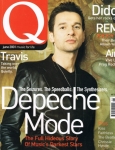Fresh
1999-2002:Part One

Photo of the group by Anton Corbijn. Reproduced without permission
NEWS ITEMS
Various news items concerning the progress and release of Depeche Mode's latest LP.
DEPECHE GET INTO WORKING MODE
DEPECHE MODE intend to begin recording their new album in June with a release slated for the end of the year. A tour is also mooted.
Songwriter Martin Gore is reported to have said told fans at the Depeche Mode annual conference in Basildon on April 15: "I'm in the studio at the moment, working on some new stuff with [engineer/ producer] Gareth Jones, and one of our friends, Paul Freeguard."
Singer Dave Gahan added: "Hopefully, by the end of this year, we'll have finished a new record, and we're gonna start recording in June. Martin's written some great songs already."
A spokesperson for Depeche Mode confirmed that the band were working through new ideas. "At present they're writing the new album," she said, "But I really couldn't say when they'll release the final thing."
It would be the first new Depeche Mode material since 'Ultra' in 1997.
New Musical Express, May 2000
Reprinted WITHOUT PERMISSION for non-profit use only.
MODE LIFE IS... PRETTY GOOD, REALLY
DEPECHE MODE are more than halfway through writing their new album, which is slated for a spring release, and have promised they will hit the road to promote it.
Speaking on a specially recorded video interview on their website, frontman Dave Gahan said: "We are probably about halfway through, maybe a little more, recording our new album - as-yet-untitled, of course. It's going really well. Martin's written some great songs, we're all in good shape. We'll be mixing it in the last part of this year and hopefully be finished by Christmas, so get ready, because hopefully by spring of next year we should have a new album out, followed by a tour, of course."
The band are working on around ten tracks at present, and have been using a string quartet and solo cellist, Knox Chandler.
The album's producer Mark Bell - who has previously worked with Bjork - also appeared in the video clip.
In a progress report earlier this month, a spokesperson said that enthusiasm was at "an all-time high" within the Depeche Mode camp, and everyone is "very excited" about the future.
New Musical Express, September, 2000
Reprinted WITHOUT PERMISSION for non-profit use only.
"We're firing on all cylinders."
Few artists can claim they're making a fresh start after two decades, but Depeche Mode, a band who have "gone the distance", in singer David Gahan's words, are doing just that. Their last album, 1997's underrated 'Ultra', was a dark transition for the band that saw them "trying to find our feet again" after the defection of keyboardist Alan Wilder and Gahan's well-publicized struggle with drug addiction. The new album has been a much healthier undertaking. "We're firing on all cylinders", says Gahan. "Martin [Gore, Depeche's mastermind] has come up with some great songs. Everybody is very optimistic." The band have been recording with producer Mark Bell (Bjork), and the process has yielded more songs than usual, according to Gahan. Early standouts include 'Sweetest Condition', 'When The Body Speaks' and 'Freelove', which is "one of the best tunes Martin has written as far as pop-ability since 'Enjoy The Silence'." And lest you worry that Gore's recent change of address to sunny Santa Barbara has turned Depeche into a vapid surf band, Gahan assures the lyrical themes involve the "usual obsessions: love, compulsion, lust, addiction...everything that's wrapped up in love - all the pain, all the joy. What's different about it, is it's not all like, 'This is hell'." So Gore hasn't traded in his black wardrobe for pastel beachwear? Gahan laughs. "No. It's beautiful [in Santa Barbara], but no."
"RC"
Alternative Press, January 2001
Reprinted WITHOUT PERMISSION for non-profit use only.
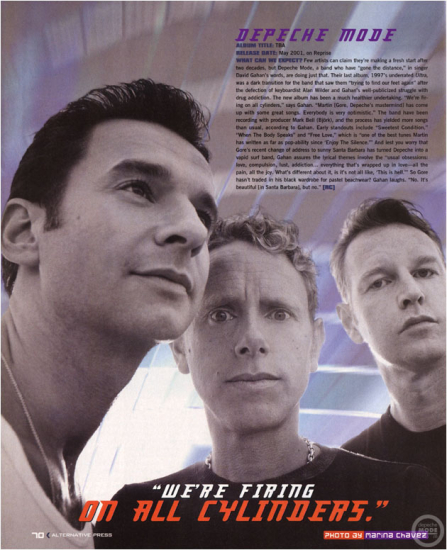
SINGLE REVIEW
DREAM ON - released April 23, 2001
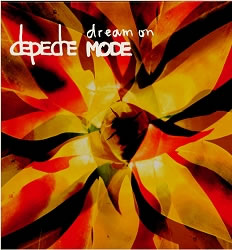
"After a decade wracked by overdoses, bust-ups and nervous breakdowns, the Mode's first all-new album since their drug-scarred 'Ultra' four years ago dips a toe in the water in the shape of this broody spaghetti western landscape. It begins unplugged and naked with a finger-picking guitar, and Dave Gahan in breathy, sombre mood. One minute later, the elemental passions and stark electronics kick in, with dark allusions to parasites and body horror. This is a stripped-down Modeworld, shorn of Spinal Tap self-parody, and reconnected to their techno-pop roots by LFO/ Bjork producer Mark Bell. A functional first single from an expansive and adventurous album."
Unknown reviewer
New Musical Express, 25th April, 2001
Reprinted WITHOUT PERMISSION for non-profit use only.
ARTICLE
AN EXCITING NEW ALBUM, ATTITUDE AND SOUND
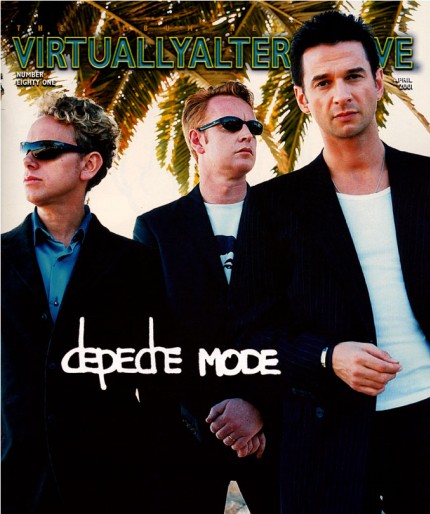
Interview by Sat Bisla
Virtually Alternative, April 2001
_____
It's been almost four years since Depeche Mode, pioneering purveyors of electronic rock, released their last studio album, 'Ultra', which spawned the singles 'Barrel Of A Gun' and 'It's No Good' and went on to sell over 4,000,000 albums worldwide. They've spent a good portion of the last year recording their forthcoming album, 'Exciter', which contains the new single 'Dream On' and a number of other radio-friendly anthems.
'Exciter' finds the group continuing to evolve (something we've come to expect from DM, one of the truly groundbreaking alternative acts from the original movement), managing to appeal to both its core audience and the mainstream music connoisseur. After two decades of creating multi-format hits, Depeche Mode has proven that it's not just another band; it's a lifestyle, if you will, for millions of fans worldwide.
The group came into existence in 1980; the original lineup included vocalist Dave Gahan, songwriter/multi-instrumentalist Martin Gore and keyboardist Andrew Fletcher, and this trio remains together after 21 years. They faced many obstacles in the 1990s, including drug addiction, emotional distress, mental and physical exhaustion and other personal challenges. However, Andrew, Dave and Martin seemingly overcame these hurdles with the release of the 1997 album 'Ultra' which show-cased a newly refreshed attitude and energy, and the group has managed to maintain its course since then.
Very few artists can boast of selling over 50 million records worldwide, all the while maintaining their musical credibility and mystique; Depeche Mode has managed to do just that. Now, the band that practically invented popular electronic music is back with a brand-new album whose focus and sound fit in nicely with today's musical landscape. They were in Los Angeles recently to film the video for 'Dream On', at the same time conducting interviews with the media at the Four Seasons Hotel in Beverly Hills, where I had the distinct honor of sitting down with these inspiring musical icons and talking about their new album, upcoming tour and other matters pertaining to the world of Depeche Mode.
I sense a more relaxed Dave Gahan singing on the new album.
Dave: Yeah, I think it's well-observed. I definitely feel more comfortable with myself and I think it helps to get out what I need to when I'm singing these songs.
Your voice sounds like it's become more seasoned and mature...like a fine bottle of wine. Are you still taking vocal classes?
Dave: No, I haven't had classes for a very long time. I thought about finding someone in New York, but I really enjoyed working with Evelyn [vocal coach on Ultra]. What she did was give me vocal exercises; we'd get together and just record what we were doing. I try to carry that around [vocal training] with me all the time. I haven't been able to do it lately, because I haven't been able to fit it into my schedule; however, when I get back to New York I'm going to get back into it. But yes, I do vocal exercises on my own. I spend 40 minutes a day doing that. Even when we're not working, I'll sing, and I've found that it's really helped to keep my vocal chords stretched and stuff like that. It's just like any musical instrument - the more you practice with it, the more you can do with it.
You've mentioned in the past that you'd taken yoga classes to help with your attitude on 'Ultra'. Did that have a lot to do with the same on 'Exciter'?
Dave: I did have a few classes. Someone I knew a long time ago that was a security guy introduced me to yoga and I took a few sessions. However, I'm pretty much self-taught, but I don't do yoga so much nowadays...I run a lot.
Martin, you've been with Depeche Mode for two decades. How does it feel being with the group after all this time? Have things changed a lot?
Martin: Things change all the time. There are always different dynamics going on. I think for the recording of this album, the inter-band relations were particularly good. We were actually able to sit down in a room and discuss things and make decisions, which sounds like a very simple and basic process, but it's something that we at one point would have avoided doing. Often our manager would have had to come to each one individually and talk to us about things; there was all kinds of weird stuff going on like that. Now we're able to sit down and talk, which is important - communication is always important between any group of people.
Do you feel that Alan Wilder's departure has had a lot to do with the sound of your last two albums?
Andrew: Not really. I do feel that Alan was a very important part of Depeche Mode and we do miss his input quite a lot.
Dave: That's very humble and kind of you, I'm sure Alan would appreciate that comment a lot. [laughing]
Andrew: To be honest, I think we got well-rounded by working with some interesting people that perhaps have got more involved because of [Alan's departure]. Alan would have tended to take more control in the studio; it meant we had to rely on other people coming in, and so far we've been lucky. Tim Simenon [producer of 'Ultra'] was very good, and Mark Bell [producer of 'Exciter'] has been fantastic for us. He's fitting in perfectly into the setup.
What are some of your favorite tracks on this album?
Dave: At the moment it's 'Goodnight Lovers' and 'When The Body Speaks'; I really think it's beautiful and I'm very proud of it. That's probably it at the moment.
Martin, a lot of people credit you as being the driving force behind Depeche Mode. You write most of the songs. Would you agree with that conclusion, or would you say it's more of a team effort?
Martin: I write the songs, but Depeche Mode is a collaboration of all three of us working together. If I were to write the songs and then record them on my own, it would sound like something completely different. Dave has a very distinctive voice and that is what gives Depeche Mode the recognizable quality. The moment our song is played on the radio, everyone recognizes it as Dave's voice because it's very distinctive. All of the various elements we bring on together; the way we work as three individual people is what makes Depeche Mode what it is.
How was it working with producer Mark Bell?
Andrew: Well, Tim [Simenon] was great and very different. Mark immediately fit in; he really got what we were trying to do and saw the sort of strengths that were there and realized the work that he had to do. He really embraced the process. Also Gareth Jones was at the helm of this album, so let's not forget to mention him.
Martin: It was a really good dynamic in the studio as well because Mark's a very likeable person and a very humble guy, and Gareth brings about a really good karma; he's got a really good aura about him. He brings a very calming influence and the two of them combined brought about a good atmosphere in the studio.
How long did it take to record 'Exciter'?
Andrew: From the time Martin started writing the song until we finished recording the album, it was probably around one year and two months. It seemed like a marathon, but it was good fun. However, we were only in the studio for about five or six months of actual studio work.
Where was the album recorded?
Dave: Part of it was recorded in London, and the rest of it was recorded in New York and some of it in Santa Barbara.
Why did you record it in different places? Was it to generate a different vibe?
Martin: That's where we all live. We always go to different places and try to split up the recording process in the various places where we live.
Andrew: I still live in London...Essex born and bred. Martin lives in Santa Barbara and Dave is in New York.
Is there a particular reason you named the album 'Exciter'?
Dave: We wanted to give the album a really optimistic, uplifting and positive title. I think a lot of the time people view us as being doom merchants, in the same sort of vein as Leonard Cohen or Morrissey, and we don't see it like that at all. So, I think it's nice for us to have up-sounding titles to our records because we think our music emanates the same kind of vibe.
What was the synergy like between the three of you during the recording process?
Dave: It was good - it was quite relaxed most of the time, to be honest. We have our routines and other things, but it was pretty laid-back. It was a very positive experience, a united sort of feeling that we like to work in.
After working together all of these years describe your relationship within Depeche Mode.
Andrew: It's like a family thing, really. We don't spend every minute of our lives together because we've got our own families and friends. I figure we've grown to respect each other's idiosyncrasies as well. We know each other well in that way and that's a good thing. On this record there are four songs with the word "love" in it. It seems like 'Exciter' is a love album, in a way.
Dave: You mean like Barbra Streisand? [laughing]
Martin: That is the main theme for the record - all of my songs are about relationships. If you look at any previous album there is that whole closeness and relationships issue.
After listening to 'Exciter', I'd have to say it sounds a lot less electronic-heavy than previous Depeche Mode records. It sounds more acoustic-based.
Martin: Actually, it's pretty electronic. Mark manages to manipulate these electronic sounds and make them appear more acoustic. These sounds are processed electronically and the technology nowadays enables you to do that a lot easier now than before. I guess we used less analog-type sounds on this album than we have in the past. But there's a mix on the guitar, some real drums and percussion. Depeche Mode always twist things around, and it never is the same after the first listen. It's not like we never create something and then find a sound and don't manipulate it in some way. It's rare that we find a sound and just use it as is.
Are the songs based upon your own experiences or are they fictional?
Martin: The songwriting experience is always a very weird one. Sometimes I don't really know where the songs come from. I sit down and start strumming a guitar or start playing some chords on a piano and words just start flowing...they come from somewhere subconscious. However, they're always from a first-person perspective and they are based on experiences; I can't even write from a third-person point of view. I can't try to imagine what's going on inside Andrew or Dave's head, you know? I get asked that question all the time and I never get over that people ask that question. It's a weird question. With Dave being the singer and me being the songwriter...that's an unusual situation, I suppose.
Dave: I suppose that's probably why. But the stuff that comes out when you're singing, it comes from somewhere. Sometimes you don't know where your inspiration is going to come from.
This album seems a lot less darker than 'Songs Of Faith And Devotion' and 'Ultra'.
Dave: I've never felt we've gone through a phase of doom and gloom. I always said that if anything, our music was more realistic than a lot of music out there. But with each record we've recorded, I've felt that each one is more optimistic than the last one; however, sometimes you wonder if it really is more optimistic. I'm much too close to it to even be able to judge at all. I just don't know.
Is Anton Corbijn working with you on the album design, stage theme and video concepts?
Dave: Yes, he's designed the artwork and photographs for the album and he's also been coming up with some ideas for the stage presentation, film footage and stuff like that. However, we did use a different producer for the 'Dream On' video. We just wanted to try someone different for a change.
When are you looking at starting your new tour?
Andrew: It'll be kicking off in North America in June; we'll be rehearsing through the end of April and all through May. It's a two-and-a-half-month tour of North America. It's a five-and-a-half-month tour altogether. It's gonna be hard, but it's not a hard slog [torturous] sort of thing. It won't be a year and a half 'Songs Of Faith And Devotion'-type of tour. It'll be kicking off in Canada and will move down into the U.S., into the East Coast and then make its way across the country to California around the early part of August.
Have you come up with a stage concept?
Martin: Anton's designing the set and he was here with us a couple of days ago, and he's put forward an idea that looks very good...it's progressing.
Are there any opening acts that you have in mind?
Andrew: We're going through that at the moment and trying to put together an interesting bill.
Do you feel that you are mentally and physically prepared for the impending tour?
Dave: We have to be! There's no time to relax when you're performing every night. It's for our fans, so we have to give them our best performance every night. You can only do this if you're mentally and physically right on, you know?
Will Depeche Mode continue as a band after the conclusion of your tour?
Martin: I don't see why not. I mean, we'll probably do the same sort of process and we'll take some time-off. We take it a year at a time, to be quite honest.
Andrew: All we can do is plan to the end of the year and hopefully we'll still enjoy ourselves and carry on. We can't plan four or five years in advance. We can't say where we'll be in 10 years because we don't know. If someone would have asked us in 1981 where we'd be in 20 years, we'd have no idea that we'd still be doing this today.
Dave: To be honest, it's hard for me to even take a day at a time. I find that there's much less pressure to do that than to think about this much work ahead of me, or how long I've been doing this and will continue to do so. Or hoping my voice doesn't go out and stuff like that. It's silly to even go there, to be quite honest...who knows?
Andrew, have you ever considered singing on a Depeche Mode album?
Andrew: I think I've got a fantastic voice. I really do. Unfortunately, Dave and Martin think I haven't got a fantastic voice; I'm voted out [laughing]. Dave and Martin are great singers and I'm not.
Who would you say has been your biggest personal musical influence growing up as kids?
Dave: Probably someone like David Bowie. When I was 14 - actually, sort of 12, I used to really like Gary Glitter. However, I feel David Bowie has been the one constant, consistent thing that I've liked from that time until now.
Martin: I'd have to agree with that too, to be honest!
Is there any one question that you've never been asked about Depeche Mode that you wish someone would ask you?
Martin: I wish that they would not ask us any questions [laughing].
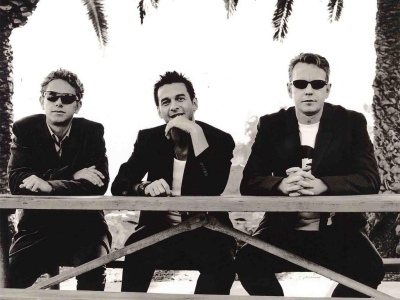
Reprinted WITHOUT PERMISSION for non-profit use only. Photo of the group by Anton Corbijn. Reproduced without permission for non-profit use only.
ALBUM REVIEWS
EXCITER (LP) - released May 14, 2001
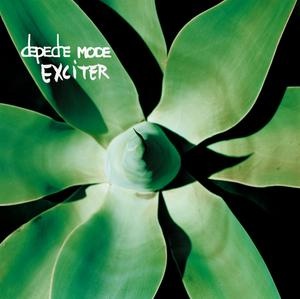
Reconstruction Time Again
"They are, of course, indestructible, and not just because singer Dave Gahan survived a hefty heroin habit. Depeche Mode seem bullet-proof because even an album as distinctly below par as their last one, 1997's Ultra, resulted in worldwide sales of over four million. The sheer momentum of a 20-year, 50 million album-selling career has enabled the Basildon trio to pull through the kind of creative troughs and work-related stress that would break lesser outfits. In this respect they are - like it or not - the closest wussy synth-rock will ever get to a Rolling Stones. And in the face of such blue-chip stability only one question remains: are Depeche Mode any good any more?
Not really. At best, Exciter is superficially attractive: an exercise in good taste that mixes contemporary droning with shuffling drums and guitar. It's a pleasant enough wrapping, provided by producer Mark Bell (Bjork), that slips easily around Dave Gahan's recharged vocals and swaggering ballads such as The Sweetest Condition.
In fact Gahan, whose ill-health hampered the making of Ultra, has rarely sounded more potent. This time it's Martin Gore who's out of puff. No amount of fashionable tweaking can hide the flimsiness of his offerings: I Am You and Breathe are sliver-thin, while I Feel Loved is a clumsy lunge towards the techno sounds originally inspired by the band. Elsewhere, The Dead Of Night feebly thanks an entire generation of US Goth rockers for their support by twinning feeble nonsense about "zombie rooms" and "twilight parasites" with an anodyne, Marilyn Manson-style mechanical grind. At which point anyone who believed Depeche Mode were a more sophisticated and subtle venture than their gloom-by-numbers imitators will begin to feel very disappointed indeed.
Present-day Depeche Mode are an enervating experience. Exciter might be measured and cool but it's also devoid of genuine drama and appealing melody: once the band's greatest strengths. Not that any of this will hurt them though: the Depeche Mode juggernaut is sure to rumble on regardless." **
Gareth Grundy
Q, June 2001
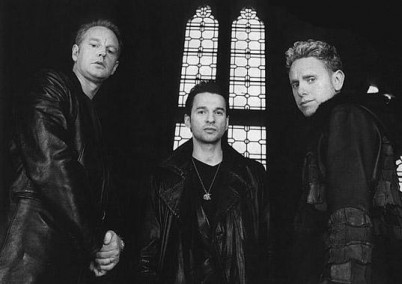
Reprinted WITHOUT PERMISSION for non-profit use only. Photo of the group by Spiros Politis. Reproduced without permission.
"After a career spanning three decades, it's difficult to work out where Depeche Mode now fit into the grander scheme of things. With the release of Exciter, this question is even harder to answer. The band certainly show they have adapted to the current musical landscape by getting producer Mark Bell (Bjork's Homogenic and Selmasongs) on board - electronic sounds back much of this album. The single, Dream On, kicks things off with a simple vocal track and drum machine beat set over acoustic guitars. When coupled with the ballroom waltz of The Sweetest Condition, the quiet tone is set early. By the time the feedback blitz of The Dead of Night hits it sounds out of place, with its rough sleaziness shaking things up. It seems Depeche Mode really have run out of ideas with the tired themes of dreaming and love used excessively." **
Chris Schulz
Rip It Up, Jun/Jul 2001
Reprinted WITHOUT PERMISSION for non-profit use only.
Everything Still Counts
"This is the album Depeche Mode seemed destined never to make. Their last two were recorded in the teeth of Dave Gahan’s near-fatal drug addiction, with band relations strained to snapping point and their electronic agenda buried under a mudslide of riffs, resentment and rehab.
But the U2 of synth-pop emerge from their blustery rock fixation [with] renewed vitality here. Producer Mark Bell, of LFO and Björk repute, has coaxed a kind of electronic-acoustic mix from the Mode which puts clear blue water between ‘Exciter’ and their most recent experiments in techno-grunge and Wagnerian trip-hop. The texture of tracks like ‘Dream On’ and ‘Comatose’ are high-tech yet organic, couching almost folkish guitar strumming in stomach-rumbling electronica.
From this solid base, Gore’s songwriting is free to veer off into diverse and occasionally sublime directions. Hence the cheekily titled pop trifle ‘I Feel Loved’, a blast of shameless disco hedonism with a side order of existential ennui.
More impressive is the cinematic ‘Easy Tiger’, which throbs and whirrs with a post-rock John Barry feel that wouldn’t feel out of place on ‘Kid A’. But the most hilarious diversion here is goth-metal stomper ‘The Dead Of Night’, a rampaging Godzilla of sci-fi glam-rock which sounds like a Panzer division invading a Marilyn Manson gig.
Gahan’s voice has never sounded this rich, and expressive. His usual stern histrionics have been largely replaced by tenderness and restraint, most notably on the string-kissed Bono-esque reverie ‘When The Body Speaks’ – described by Gore as "the Righteous Brothers playing next door to a rave" – and the serenade ‘Shine’. But better still is beatific closing number ‘Goodnight Lovers’, where Dave purrs and whispers over a gliding ambient lullaby to "all soul sisters and soul brothers". This is the one to soften even hardened Mode-haters, a gorgeous moment of sensual healing.
As ever, Gore’s lyrics address love as suffocating sickness, addiction as pleasure, sexual longing as psychosis – although the clammy cold turkey references in tumbling doom-waltz ‘The Sweetest Condition’ pack a special resonance in the wake of Gahan’s chemical travails.
Lyrical gloom aside, though, ‘Exciter’ sounds like a band not just revitalised but reassembled from scratch. Not many long-running groups could make an album this fresh and confident in their 20th year, never mind one which bridges timeless soulman crooning and underground techno. If we still need serious grown-up bands in these atomised, scrambled, pop-crazed times, then we still need Depeche Mode." (8)
Stephen Dalton
New Musical Express, 12th May, 2001
Reprinted WITHOUT PERMISSION for non-profit use only.
"Depeche Mode should be horribly burnt out or split up by now: They lost their initial songwriter, Vince Clarke, after their 1981 debut; their principal musician, Alan Wilder, after their eighth album; and their sanity in 1995, when singer Dave Gahan became a heroin addict and attempted suicide. It's easy to forget that these Essex, England, unlikelies have been around as long as R.E.M., U2 and Duran Duran. But unlike those titan troupers, they never made an embarrassing album (live discs aside) and never became so huge that they overstayed their welcome. Even at the peak of their late-1980s teeny-bopper popularity, these quintessential synth-poppers somehow remained punk. Lingering in gorgeously melodic, genuine sadness, Gahan, Martin Gore and Andrew Fletcher still have the knack for turning a lifelong bummer into one big black celebration.
But even old reliables have their ups and downs, and Depeche Mode's tenth studio album ranks miraculously high. Produced by Bjork collaborator Mark Bell, Exciter glimmers like a gentle ambient doodle with vocals: The beats are mostly minimal, closer to early Kraftwerk than to current electronica. But because Gore's songwriting is so focused and Gahan's vocal presence is so commanding, the softest songs leap to the foreground like a whisper from a lover.
Although they integrate guitars and orchestrations with greater finesse, the skeletal arrangements leave Gahan no harmonic place to hide, no singalong choruses to coast. Lips pressed against the mike, the rehabbed frontman turns in his most physically intimate, emotionally masterful performances on unearthly ballads like "When the Body Speaks." Yet he also proves himself capable of summoning bygone sleaze on the album's hilariously sullied, sole industrial jam, "The Dead of Night." And on one of Gore's vocal cameos, "Breathe," his wounded choirboy tenor sounds grandly operatic in the Scott Walker lounge-troubadour tradition.
Recent landmark albums by kindred spirits Radiohead and Moby may have rejuvenated their white machine soul, but the Modesters have never kowtowed to trends. Exciter isn't nearly as catchy as hit-packed discs like 1987's Music for the Masses. But from the breathless acappella opening of "Dream On" to the closing strains of "Goodnight Lovers," Exciter maintains an otherworldly mood and purity of purpose that today's angst-ridden rockers would trade their Jeff Buckley CDs to attain."
Barry Walters
Rolling Stone, 14th May, 2001
Reprinted WITHOUT PERMISSION for non-profit use only.
Comeback CD of the week
They went from Basildon to packing the world's stadiums. Then it all fell apart.
But Depeche Mode are back in lean and mean form, says Dave Simpson
"Everyone reaches a time in their life when they have to get rid of the clutter. For most of us, this could mean anything from family heirlooms to unnecessary personal complications. For Depeche Mode, this means the excess baggage of a 20-year journey from squeaky Basildon electro-poppers to stadium art-rockers who have trotted the globe and almost killed themselves in the process.
Exciter is their 10th album, as significant a milestone for a band as a person turning 40. The powerful guitars that marauded their 90s album have disappeared, along with the more strident of their anthemic choruses. The creative fog that accompanied a breakdown in band communications has been replaced by a new understanding. Most pivotally, although Dave Gahan has long bid goodbye to the hard-drug use that resulted in a suicide attempt in 1996, Exciter is the first album Depeche have completed since his recovery. The scars haven't disappeared, but this is Depeche at their most stripped down, confessional, raw and intimate. It's partly a return to the electro-art plot that was lost somewhere after 1989's masterpiece, Violator. [Violator was released in 1990 - BB] But it also feels like a new beginning.
In cutting their art to the quick, the addition of a new producer has proved crucial. Mark Bell twiddled Björk's Homogenic and Selmasongs but was originally in Warp Records experimentalists LFO, and he has given Depeche an edginess they haven't had in years. The electro beats have been slowed to a deathly pulse; the sound of a science-fiction landscape. Exciter is littered with electronic booby traps and sonic trapdoors that could lead anywhere and nowhere. Like the listener, it is never allowed to settle: Exciter can be gloriously optimistic or devastatingly bleak, depending on how it catches you.
Central to Exciter is the peculiar musical relationship between songwriter Martin Gore and Gahan. Gore claims not to write with Gahan in mind, and would no doubt argue that Exciter's themes - love, obsession, insecurity, displacement, redemption and, repeatedly, addiction - are universal, but virtually every line seems to bear some significance to the singer's experience. Either Gore is subconsciously addressing his pal, or playing psychological games to push his partner to the limit. Whatever, something has prompted Gahan into the strongest, most heartfelt vocal performance of his career, typified by the venom he puts into Shine's eerily mocking line: "You've been hanging from a rope of mediocrity, strung up by your insecurities". On Comatose, a dangerously pleasurable near-death experience, you can almost hear the wounds open and be healed. [Actually Martin takes the lead on this track - BB]
Exciter's breadth of vision is illustrated by Dream On, the stark, experimental single, which manages to be equal parts Kraftwerk and Robert Johnson. But there are songs here too - the gorgeous, humble Freelove, the craving The Sweetest Condition - as singable as anything they've done. When the Body Speaks, a body versus soul dilemma, is particularly stellar, the fragile, tinkling guitars recalling U2 at their most awestruck and devotional.
The band haven't lost their capacity for excess. Exciter's 13 songs are two too many (the Morricone-like instrumental Easy Tiger, and the incongruous-sounding, Marc Almond-like Breathe). Nevertheless, this is a revitalised Depeche Mode: cleansed, streamlined, and in prime condition to take on the world again." ****
The Guardian, 11th May, 2001
Reprinted WITHOUT PERMISSION for non-profit use only.
Read other reviews in Alternative Press and Mojo
ARTICLE
IN A RELAXED MODE FOR 'EXCITER'
by Larry Flick
Billboard, 19th May, 2001
_____
Depeche Mode's Martin Gore, Dave Gahan, and Andrew Fletcher are laughing. The tension of a long day of glad-handing on behalf of their new disc, 'Exciter' (Mute/Reprise, May 15), has been broken by a spate of playful jibes and jokes.
Ensconced within the sunny, plush setting of L.A.'s Four Seasons Hotel, the band exudes a warm, almost familial air that seems uncharacteristic for an act that has amassed a 20-year catalog of songs about life's darker edges.
"We've seen each other through enough twists and turns over the past 20 years that we are a family," Gore says, referring to a headline-grabbing history that includes various band members' bouts of drug addiction, alcoholism, and near-suicidal depression. "We've invested as much in each other as blood relations."
The laughter that fills their hotel suite indicates that they've come out on the healing side of the personal drama. "There were days in the not-so-distant past when I wondered if I was going to be able to proceed with this band," Gahan admits. "To be in a place where we're sitting here - feeling happy and healthy - and talking about a new record is extraordinary. It's quite humbling, actually."
The members of Depeche Mode may be happier in their personal lives, but 'Exciter shows the band in classic musical form. Their first collection of new tunes since 1997's 'Ultra' (between sets, they issued 1998's 'The Singles: '86-'98', a best-of compilation) is typically moody, always introspective, and often literate. Gahan continues to be the compelling vocal embodiment of Gore's hypersensitive, often haunting words.
If there's any significant sign of growth within Depeche Mode's music, it's in the instrumentation. Although the band is wisely continuing to mine the searing synth-pop sound that sparked a string of hits ('Just Can't Get Enough', 'People Are People', and 'Personal Jesus') and helped to shape the electronica movement, it is now adding elements of traditional blues, retro-funk, progressive rock, and orchestral pop to its arrangements.
For example, 'Dream On', the first single, is distinguished by nicely detailed guitar work as well as skittling, staccato beats, while 'The Sweetest Condition', a strong single option, layers languid slide guitar lines into a mix of industrialized keyboards and swaying rhythms.
Produced by Mark Bell, 'Exciter' also benefits from such potent tracks as 'When The Body Speaks', on which a quietly rumbling beat supports delicate guitar lines and an intimate, almost whispered vocal by Gahan; 'I Am You', wherein futuristic instrumentation is offset by a hypnotic chorus chant of the words, "I am you/And you are me" and further enhanced by a sweet midsong symphonic interlude; and "Goodnight Lovers", a gospel-spiked ballad that closes the album on a pensive, meditative note.
"After 20 years, making a Depeche Mode record can be quite a challenge," Fletcher says. "You have to feed the monster, if you will, that demands very specific sounds and stylistic elements. But you also have to feed yourself. You have to feel like you're doing more than merely painting by numbers."
Gore, who remains the band's primary tunesmith, agrees. Yet growth didn't come easily this time, as he admits to hitting a dry spell while writing material for 'Exciter'. "I started working on songs about a year and a half ago, and I struggled. I spent the first six months doing nothing. I couldn't get motivated. I couldn't come up with an idea that worked for me. It was actually quite frightening."
Then Gore decided to break his typically solitary writing parameters and invited Bell and the other band members into his process "just to bounce ideas off", he says. "Having people there provided the pressure I needed to get rolling. It also pushed me to consider different ideas as I was writing, which was great - if not a little tension-inducing at times. I'm a naturally shy person about my music, so it was a challenge to let my ideas flow freely in such a raw state."
In the end, though, Gore notes that this batch of songs has greatly revitalised his interest in Depeche Mode. "Some of my favorite songs of the past 10 years are on this album. I'm extremely proud of what we've accomplished this time."
For Gahan, 'Exciter' is a chance to prove that he's still "got the goods". He says, "Let's face it, when you've reached the unfortunate point where you've nearly ended your life - and the world's been watching the entire time - there comes a minor need to establish and affirm, if only to yourself, that you can still get the job done."
If anything, Gahan says he is at a point where he's "never felt stronger or more creatively alive". And, after years of performing Gore's material, he feels that it's "just about time to write and record some of my own songs." He adds that the forum for his creative expression is still being formulated and that it's not likely to surface until after Depeche Mode has put its latest project to bed.
And 'Exciter' is not likely to be put to bed anytime in the near future. 'Dream On' is building a solid radio audience in the States - particularly at KROQ Los Angeles, which recently held a ticket pre-sale for a forthcoming local gig.
The track is also a bona fide smash in Europe, where it's already topped the charts in Italy, Spain, Denmark, and Germany. It's also reached the top 10 charts in the U.K., Finland, Sweden, Norway, and Austria.
Among the choice bits of international promotion for the project is a special two-hour radio documentary on the band for BBC London Live. The show aired May 7, and it's now available in streaming form on the band's Web site (depechemode.com).
All of this activity is whetting appetites at retail, where the band remains popular. "Word-of-mouth has been steadily building on this record for several months," says Marlon Creaton, manager of Record Kitchen, an indie outlet in San Francisco. "This band has one of the most loyal followings I've ever seen."
Those die-hard fans should be pleased that Depeche Mode is hitting the road for a five-month, 24-country tour this summer. The trek will begin June 15 in Montreal and finish Oct. 30 in Istanbul, Turkey. Tickets for the tour went on sale in late March, and sales have been brisk.
This is the band's first road jaunt since 1998's The Singles tour, where it played to more than 1 million fans in 18 countries, according to the label. "That was a scary tour for me," Gahan notes. "The pressure was high. But this one is going to be great."
Fans can expect a typically elaborate show, with longtime artistic collaborator Anton Corbijn on board to provide stage designs. "Anton is almost like a member of the band," Fletcher says. "He interprets and dissects our music in a way that is staggering. He's full of brilliant surprises and lots of fun."
Right now, a round of brilliant surprises and a lot of fun is precisely what the members of Depeche Mode are hankering for. "We're ready for anything," Gore says with a smile. "This time, we're all going to remember every moment, every step of the way - and that's the most brilliant part of it all."
Reprinted WITHOUT PERMISSION for non-profit use only.
ARTICLE
MANY SMACK-FREE RETURNS!
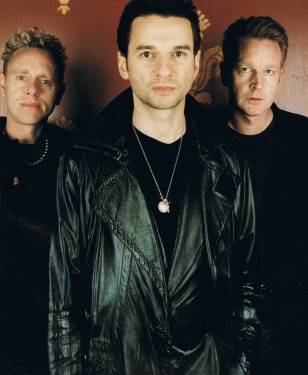
by Dorian Lynskey
Q, June 2001
_____
Once, they took a psychiatrist and a drug dealer on the road.The shrink was sacked but the dealer stayed on. Then their singer eagerly sought a hat-trick of heroin addiction, divorce and suicide. But Depeche Mode have made it to their 2oth anniversary fit and happy. How the hell did that happen? ponders Dorian Lynskey. Photos by Spiros Politis.
IN summer 1994, the Dave Gahan diet went something like this. After regaining consciousness at some point in the afternoon in a hotel room in America, he would start the day with two glasses of vodka. His throat so ravaged he couldn't speak, the singer would call Jerry, his minder, and communicate by tapping on the phone in code. Then he would get into his limo to the airport, stopping en route to grab a McDonalds, his sole meal of the day. On the plane, it was time for a couple of Valium and a blackout.
When he arrived at the venue, the tour doctors gave him steroids for his throat and painkillers for everything else. "I was a garbage can," he ruefully recalls.
By the time he got on stage, the cocktail of chemicals, spiked with a giant jolt of adrenalin, tended to create an equilibrium so that he'd feel strangely fine, strutting and whooping as if nothing was wrong. Afterwards, though, he would retreat to his hotel room, never once talking to his bandmates, and spend the rest of the night injecting heroin alone. Repeat to fade.
By the end of Depeche Mode's 14-month, 158-date Songs Of Faith And Devotion tour, Dave Gahan weighed just 100 pounds and looked as pale and thin as a chalkmark.
Unbelievably, the next two years were worse still, a gruesome object lesson in Why Heroin Is A Bad Thing. In between abortive spells in rehab, Gahan's life unravelled at terrifying speed - his second wife left him, his first barred him from seeing their young son, Jack, and his house in Los Angeles was ransacked by burglars. He also wound up in hospital emergency rooms so many times that West Hollywood paramedics nicknamed him The Cat. On one occasion, he swallowed wine and valium and slashed his wrists in a suicide attempt. Notoriously, he overdosed on a cocaine and heroin speedball in his room at the Sunset Marquis, suffered a cardiac arrest and was technically dead for two minutes.
Gahan's excesses may have been the most spectacular, but he wasn't the only one in Depeche Mode with problems. During the same tour, fresh-faced songwriter Martin Gore was drinking at least two bottles of wine before every show, convinced that if he tried to perform sober then he would forget how to play. Keyboardist Andy 'Fletch' Fletcher didn't even make it to those final US dates, bailing out in Hawaii after a nervous breakdown. Studio wizard Alan Wilder was hopelessly alienated from his bandmates, and within a year he had left for good.
"You mustn't have this impression that there was one guy having all the problems and causing the whole ship to sink," Andy Fletcher insists, with a strange kind of pride. "There were many holes in the boat."
Behold Depeche Mode, then: the band who never knew when, or how, to stop.
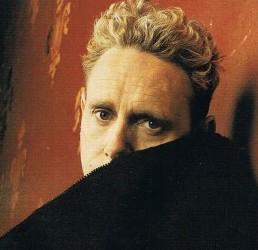
DEPECHE Mode released their first single, Dreaming of Me, on 20 February 1981, and the fact that they're alive and well 20 years later with their tenth studio album, Exciter, is a small miracle. A British electronic band with the hedonist appetites of American rock pigs, Depeche Mode started partying so hard in the early '80s, and carried on for so long, the wonder is it took them until 1994 to come to the brink of falling apart.
When Dave Gahan's problems became public, they buried the long-running perception of the band as a faintly ludicrous, faux-doomy pop act with a penchant for black leather. Maybe it's their sartorial quirks over the years, or their preference for synthesizers over guitars, but Britain has always had problems taking Depeche Mode seriously.
Happily, they couldn't care less. They're the most enduring and internationally successful British band of their era. Throughout death, drugs, depression and departing members, they have always had an ear for innovation and a good tune, and have never made a rotten album. In America, they are the acme of Anglophile hip - the band that made musings on death, God and S&M seem at home both in stadiums and on dancefloors. Smashing Pumpkins, Nine Inch Nails, Slipknot, Korn, Deftones, DJ Shadow and Detroit techno producers have all doffed caps in their direction.
"I was reading Prozac Nation and I think it's us and The Smiths that she [author Elizabeth Wurtzel] accuses of being 'miserable chic'," guffaws Gore, one of those rare people whose laugh sounds exactly like "ha ha ha". "But we just tried to bring some element of reality into pop music."
Today, Depeche Mode are holding court at London's Home House, an extravagantly plush private members' club where the only non-antique item in each room is the telephone. Now approaching 40 but not - Gore insists with a grimace - 'grown up', they aren't yet showing their age. Gore, sporting a ski-hat and peculiar patchwork leather jacket, is bright and boyish, while the sensibly dressed, bespectacled Fletcher still looks like the world's least likely rock star. The fact that they can hire out rooms in a place dripping with money and yet turn considerably fewer heads than EastEnders' Tamzin Outhwaite, the afternoon's other resident celebrity, says a great deal. They are perhaps the biggest cult band in the world.
Alone, in a room down the hall, is Dave Gahan. The first thing he says is, "Come here, I won't bite you. Despite what you may have heard." A wolfish grin spreads across his chops, which are clean-shaven and glowing with health again. Even his haircut is back to its late-'80s model and he's clad in sleek black from head to toe, bar the pale blue socks peeping out from beneath his leather trousers. In his hand smoulders a slow-burning cigarillo, his sole remaining vice. Only the tattoos and scar tissue on his pale, bare arms map out the contours of the dark times. Sometimes, he trails off in mid sentence, but mostly he is whip-smart, open and intensely engaging as he retraces Depeche Mode's twisted path over the past two decades.
"They defy the laws of gravity," opines Daniel Miller, the Mute label founder who signed and mentored them. "No, they redefine the laws of gravity."
IF THERE'S ONE thing that everybody knows about Depeche Mode, it's where they're from. Basildon has been tarred as a joke town, but the band's memories are of unemployment and chucking-out time aggro. It wasn't a cozy place for four working-class teenagers to spend the late '70s.
While Gore, Fletcher and their friend Vince Clarke were shy church-goers (though Gore denies he was ever a believer), Dave Gahan was in juvenile court at 14 for vandalism and stealing cars. When he switched his attentions to amphetamines, punk and clubbing in London, he became the ideal charismatic frontman for the other three's new synth group, Composition of Sound. "When I first met these guys I got the feeling they had led very sheltered lives," Gahan admits, an Essex swagger still in his voice.
Clarke's jaunty, minimalist hits and the band's hopelessly unformed image cast the rechristened Depeche Mode (a name Gahan plucked from the cover of a French fashion magazine) as teen-pop naifs, an image that lingered. When Clarke left (to form Yazoo and later Erasure) after the release of 1981's debut disc, Speak And Spell, self-confessed pessimist Gore took up songwriting duties. Alan Wilder, a middle-class West Londoner, was recruited as a studio replacement. Gore insists there was friendship of sorts ("Maybe it's false intimacy when it's all based on partying, but I think Alan would have to admit that he had fun with us at times,") but even early on Gore and Fletcher constituted one faction, Wilder and Gahan the other.
The recurrent tensions clearly didn't do too much damage. Their refusal to use preset keyboard sounds or to sample melodies from other records made them unique amongst electronic bands. Third album, Construction Time Again (1983) ventured into pipe-banging industrial sampling and toytown socialism, while the following year's Some Great Reward, containing breakthrough US hit People Are People, introduced perv-pop and cynical wit. "Suddenly we'd turned into a proper band," says Gahan. "Totally by accident, I think."
Both albums were partly recorded in Berlin, where Gore had moved after splitting up with his devout Christian girlfriend. A shy teenager, he had immersed himself in the club scene - fans of bizarre rock clobber will fondly recall his leather skirts and bondage straps. For a long time afterwards, his lyrics laid out a kind of manifesto for hedonism as a defence against the boredom and disappointment of everyday life. As he wrote in the lyrics to 1987's Strangelove, "I give in to sin/Because you have to make life liveable." If it wasn't for his candy-floss hair and impish grin, people might have believed him earlier.
Gahan, meanwhile, had settled down with his soon-to-be-wife Joanne. But in Berlin, where the bars opened late and Depeche Mode were celebrities, temptation winked. "I'd already had these wild years and I guess I did have a longing to have some kind of normality in my life on a personal level. But, to be honest, I was fooling myself."
With the inclination towards excess already there, only the funds and opportunities were lacking. But not for long. With 1986's dark, claustrophobic Black Celebration and the following year's anthemic Music For The Masses the band made giant career leaps as much as creative ones, proving that electronic music could sound expansive and powerful enough to fill arenas. Simultaneously, Dutch photographer Anton Corbijn became their longstanding designer and video director, moulding four disparate individuals into a stylish unit. When Martin Gore named Music For The Masses, he was making a sly joke about always being on the verge of global success without ever quite getting there. As it turned out, it was no joke at all.
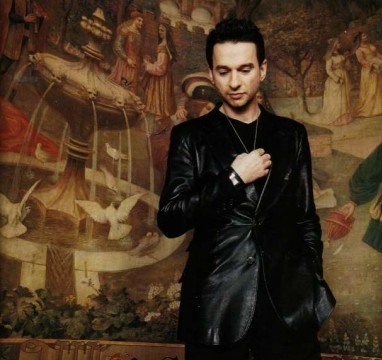
IN Depeche Mode's 1989 tour film, 101, there is a fine Spinal Tap moment. It is the triumphant final night of the Music For The Masses tour and Dave Gahan is pacing his dressing room at the Pasadena Rosebowl, agonising over whether to shout "Hello Pasadena!" or "Hello Rosebowl!" When the tour manager suggests he says, "Good evening, welcome to the concert for the masses," Gahan retorts, "I'm not fucking Wordsworth, you know!"
The fact that Gahan had the opportunity to shout anything at all to 60,000 Americans seemed remarkable to British viewers. But watching him wiggle and prance and shout "Hey!" at every opportunity while the other three prodded their keyboards, it was clear what an unexpectedly thrilling live proposition they had become: Kraftwerk fronted by Rod Stewart.
"After that film came out, suddenly we were this 'stadium band', which wasn't actually true - we'd played one stadium - but the perception really changed," says Gahan. "We started to get bigger than I'd ever imagined we'd be."
After 101, everything was primed for Depeche Mode to deliver their best album, so that's what they did. With producer Mark Ellis, aka Flood, they decamped to Milan, where their clubbing exploits helped inspire the lean, gleaming sound of Violator, a record that also contained some of Gore's best songs. When they announced dates for the World Violation tour, every single ticket sold out in advance, and the tour became one long lap of victory, fuelled by cocaine and E.
"We hit a point during the Violator tour where everything was just great," reminisces Gahan. "But I think I overdid it even then. Every night, after coming off stage, we'd all get on one and go out...If you can imagine going out on tour for a year and a half and you're like this circus and then you finish all that and come back to the reality of your life. The longer those tours got, the less satisfied I became with normal life. For me that was the last time the partying side of it was fun."
Radiohead flirted with madness during the OK Computer tour, Oasis have problems spending any extended time on the road without a punch-up, and most other recent British bands have never had the worldwide popularity necessary to find out what month after month of arenas can do to people not psychologically equipped for it. Perhaps if Depeche Mode hadn't been so lousy at communicating with one another they might have realised they were walking on glass. Or if they had let their indulgences affect their work then somebody else might have intervened. But, at the time, there seemed no reason to stop having fun, so they didn't.
One legacy of World Violation was Gahan's love affair with their Californian PR girl, Teresa Conway, and the disintegration of his ailing marriage to Joanne. "It was nothing to do with my first wife," he contends. "I was yearning, I think, for some sense of adventure again."
Gore and Fletcher, meanwhile, were becoming fathers for the first time, and Wilder had just married his long-term girlfriend. Gahan's enthusiasm for going out with the rest of the band had waned anyway, so he decided to relocate to Hollywood with Conway. (He hasn't lived in Britain since but still has an endearing habit of hastily correcting his Americanisms: 'ass' to 'arse'.) After living like a rock star on tour, Gahan wanted to look like one, albeit a cartoonish version. With Conway's encouragement, he grew his hair long, got tattoos and started going to gigs again - they even got married in front of an Elvis impersonator in Las Vegas.
"A lot's been said about that image, but also during the whole of the '80s, that wasn't me either," Gahan elaborates. "I felt I wasn't having to lie anymore and pretend I'm some clean-cut guy, when really during the '80s we were out drinking and tooting it up, like everybody was doing. I actually felt like I was living more honestly. I didn't realise how quickly I was spiralling cos I was living like that every day. It didn't have to be a gig or anything, it was always that kind of drama attached to my life in Los Angeles."
Part of the "drama", although Gahan never calls it by name, was heroin. But when he talks about his first months in LA, it's with rogueish amusement rather than regret. Properly wealthy for the first time in the wake of the world-conquering Violator, experiencing a second adolescence surrounded by a loving new wife and people impressed by his fame, he clearly enjoyed himself, for a short while at least.
HALFWAY through 1992, Depeche Mode convened in Madrid to start work on the next album and realised that, in their 18 months apart, everything had changed. "I was excited and I really wanted to bring that sense of enthusiasm back and, to my dismay, once I walked into the studio I realised that nobody else was on the same page," remembers Gahan. "I think the band were pretty scared of me. I was definitely off my rocker."
"I don't think we'd seen pictures," agrees Gore. "It was a real shock to see him with long hair, covered in tattoos, even dressed in different clothes. I think when we first got together in Madrid it became obvious that there wasn't a real feeling of band unity."
Producer Flood had the wheeze of getting the whole band to live together during the recording process, but it did no good. Perhaps it was down to English reserve, but they evaded their problems rather than dealing with them. Talking about it now, the defiantly non-confrontational Gore seems contrite.
"I don't think I was aware of it as much as I should have been," he admits. "I remember when I didn't like the direction that certain songs were going in I would sulk for a few days, and maybe that caused tension. Dave wasn't really driving it as it was during his honeymoon period with heroin. Although we had a row of bedrooms next to each other, he would disappear for three or four days at a time."
It's to Gore and Fletcher's credit that they don't pin the blame on Gahan or the increasingly disgruntled Wilder, who felt his contribution wasn't appreciated. The precarious interpersonal architecture that had held them together was falling apart, and nobody was in a position to prop it up. Fletcher was struggling with depression and was hospitalised during the final album sessions in Hamburg: "I was too busy worrying about myself, let alone worrying about Dave. And also we felt slightly hypocritical because we were doing our own things as well."
Gore, meanwhile, was out clubbing most nights and drinking heavily. "At the time I never felt it was necessarily a problem," he says, marvelling at his capacity for self-delusion. "I just drank too much. I had a couple of seizures and I was told by doctors that it's when your body goes into withdrawal. So sometimes I woke up after a heavy night, started having a panic attack, then I'd immediately think, Well if I go to the pub and have a drink I'll be OK." Gore didn't even realise that Gahan was using heroin until a meeting at Alan Wilder's house on their return to Britain: "To be honest I was really ignorant, but once the pieces of the puzzle had been put together for me then it all made sense."
If Songs Of Faith And Devotion had been as bad as the atmosphere surrounding its gestation, the subsequent tour wouldn't have been so destructively long. Against the odds, however, it was one of their best, most adventurous records (it remains Gahan's favourite). And so, on 19 May 1993 they played their first date in Lille, France. Nobody had mended their ways, although Gahan impressively managed to juggle his heroin habit with intense workouts and an hour-and-a-half of yoga a day.
"Since Violator's success, I think we felt that we were indestructible," Fletcher reasons. "We were very naive."
"We still managed to have fun," Gore insists. "It was just never-ending." Fletcher reckons they were the first band to go on the road with a psychiatrist and a drug dealer - the psychiatrist was laid off but the dealer stayed. "The bigger the tours get, the easier it is to party," label-boss Miller contends. "It's a bubble in which anything can happen as long as you perform on stage. I went out on the tour and thought it was horrible. I remember being introduced to the official drug dealer and at that point I thought, Fuck this, there's nothing I can do."
The addition of the second American leg was a major bone of contention, but Wilder and Gahan argued that with scaled-down production costs it would make them millions, so on it rolled, with the barely talking members travelling in separate cars. Gahan's choice of support act didn't help either. "Primal fucking Scream," in Miller's words. The results were gruesome. In LA, Gore had a seizure, brought on by alcohol and stress, while Gahan overdosed after a show in New Orleans. Yet still they kept on, and Gahan showed no signs of calming down on stage or off. "I realise today how much I'm carried, how much I'm taken care of," he reflects, with the semi-religious language of many a converted addict.
"Sometimes I don't know how I really did survive that. Everything's been said about the insanity of that tour but it was. It was that, and more."
Alan Wilder officially resigned from Depeche Mode a year later. Daniel Miller firmly believes that if he hadn't, the band would have collapsed. "It was so obvious that those four people could not make another record together."
Fletcher's less charitable about Wilder's motives. "I think he felt the band would split up, what with the state Dave was in. I think he wanted to be the first one to jump ship."
Ultra, Depeche Mode's ninth album, was thus recorded as a three-piece, with producer Tim Simenon shouldering much of the weight. In May 1996, halfway through recording, Gahan overdosed, but even then it took an intervention from his friend Jonathan Kessler, the band's accountant-turned-manager, to convince him to check into the Exodus Recovery Centre. He was court-mandated to live in a sober-living house with other recovering addicts ("the closest friends I've ever had in my life"), then moved to New York with his new girlfriend, Jennifer. He hasn't had anything stronger than a cigarette since.
WHEN DAVE GAHAN talks about what he calls "all that bollocks", he alternates devastating honesty with awkward pauses, perhaps mindful of the fact that Ultra's musical qualities were overshadowed by his soul-baring confessions to the press. As a faint silver lining, even cynics had to admit that there was a kernel of truth in Gore's recurrent lyrical obsessions with extremity, sin, guilt and absolution after all, although Gore maintains, as always, that "I never think of Dave when I'm writing the songs."
"I don't actually believe that, to be honest," Gahan counters. "I think he has a deeper sense, and knows that some of the things he writes about are what's going on all around us. That's how I feel connected with him. We don't talk much."
Depeche Mode put their recovery to the test with a worldwide trek to support their second hits collection, Singles 86>98. On a typical day they would sightsee in cities they had only previously glimpsed through car windows and an alcoholic fug. Where once there was a drug dealer now there was a masseur, and Gore's pre-show two bottles of wine had become two small glasses.
The result of their rejuvenation is Exciter, recorded over the past year with producer Mark Bell (LFO, Bjork) in London, New York and Santa Barbara, where Fletcher, Gahan and Gore respectively live. "I wake up every day and I see sunshine and I see amazing mountain views and I do feel a bit more in touch with God, whatever God is," beams the songwriter.
Blame it on the sunshine, or the settled wife-and-kids lives of all three members, but Exciter is the most optimistic record the band have made in 20 years. There are still some dark shadows and intimations of perversity, but there are also unapologetic love songs, Freelove and Goodnight Lovers, with Gahan's voice warm and intimate. Yet the distance between Gahan and his bandmates remains. Now that he has channelled his energies into music rather than narcotics, he is antsy about the friction between Gore's perfectionism and his own looser, more organic tastes, and plans to release a solo album in that vein next year.
"I have a feeling that he respects me as much as I respect him but he has an inability to actually acknowledge it," Gahan frowns. "Martin's not the sort of person who turns around and pats you on the back and goes, That's fantastic. To be honest, I wouldn't know what to do with that anyway."
Depeche Mode are clearly not the last gang in town, and not one of them can explain why they have kept on going. Daniel Miller has a theory though. "A lot of the arguments that they have now are identical to ones they had 20 years ago. Fletch and Martin have always been mates but Alan was always the outsider and even Dave didn't grow up with them. If they'd all been big mates at the beginning and then grew apart, that would have been different, but relationships haven't changed that much. Who knows? If you start trying to define it, it falls apart."
Gahan, for one, wouldn't even try. He has endured such self-induced horrors that the fate of Depeche Mode is no longer his top priority. The interview finally over, he looks suddenly drained and starts talking about how much he misses Jennifer, now his third wife, and his baby daughter Stella. "I really have a life now," he reflects. "I have a life separate from Depeche Mode. It's the first time I've had that in years and I'm determined not to fuck it up. I still make mistakes but I'm there for it. I'm not running away any more. I'm right here."
And Dave Gahan smiles at the wonder of it all.
Reprinted WITHOUT PERMISSION for non-profit use only. Photos by Spiros Politis reproduced without permission.
SINGLE REVIEW
I FEEL LOVED - released July 30, 2001
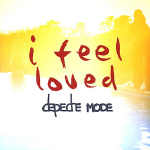
"Post-drugs contentment may have given the Mode their best album in years but there is still a vague air of mid-life drift about tracks like this - plush, polished, executive-class disco pastiche full of expensive noises but not much passion. Still, it certainly exudes more authentic dancefloor zing than superstar DJ Danny Tenaglia's flaccid house mix, which reeks of a lazy contractual obligation bashed out on the way to catch a flight to Ibiza. Iggy's 'Dirt' is also here, reworked into a slo-mo gothcore stomp. Trent Reznor must be spinning in his grave. You know, the one where he sleeps."
Unknown reviewer
New Musical Express, 1st August, 2001
Reprinted WITHOUT PERMISSION for non-profit use only.

